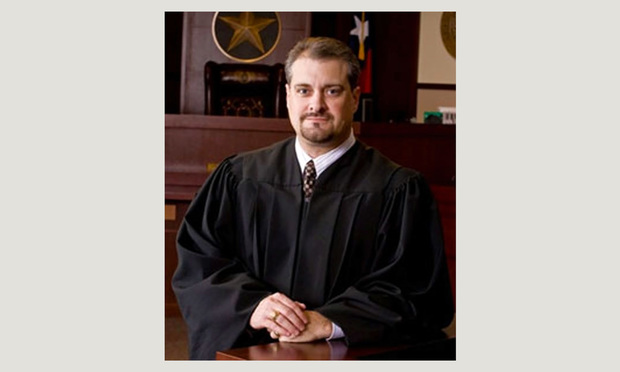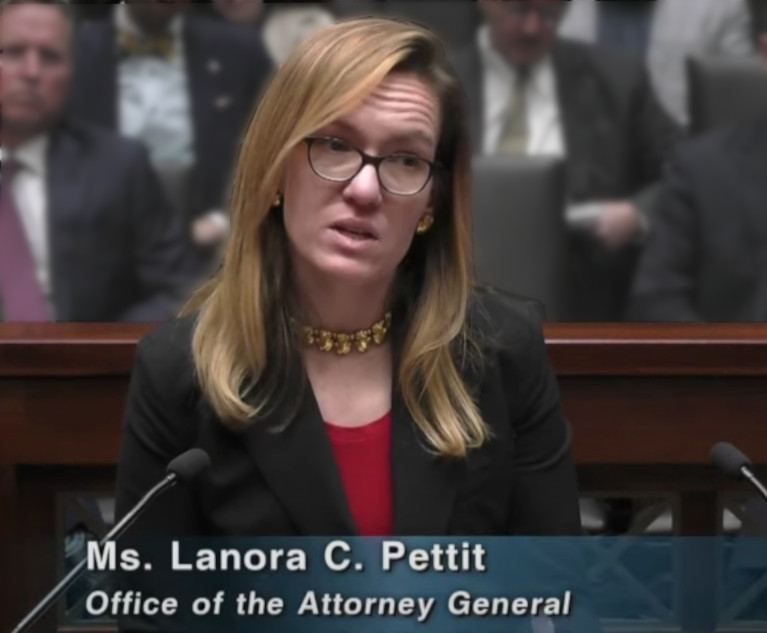Public Admonition for Texas Judge Who Called Litigant's Testimony 'Crap'
State District Judge Jonathan Bailey's “course of conduct throughout the entire proceeding showed a deep-seated antagonism for father that violated father’s constitutional right to a fair trial,” the public admonition said.
August 02, 2019 at 01:12 PM
4 minute read
 431st District Judge Jonathan Bailey of Denton County
431st District Judge Jonathan Bailey of Denton County
State District Judge Jonathan Bailey was publicly admonished for showing deep antagonism for a father in a child-custody case and violating the father’s rights to due process and a fair trial.
The Texas Commission on Judicial Conduct this week released the July 16 public admonition, which condemns Bailey’s conduct.
Judicial ethics rules require judges to recuse themselves when it’s appropriate, to be patient, dignified and courteous to those who appear before them in court, and to perform their duties without bias or prejudice.
“Judge Bailey’s course of conduct throughout the entire proceeding showed a deep-seated antagonism for father that violated father’s constitutional right to a fair trial,” the public admonition said. “The judge failed to treat father with patience, dignity and courtesy by characterizing his trial testimony as ‘ridiculous’ and ‘crap’ and threatening him with prosecution for perjury.”
Bailey didn’t immediately return a call or email seeking comment. However, when he responded to the judicial misconduct complaint, he admitted to making mistakes in the case that ruined his impartiality as a judge and violated the father’s rights.
“He stated that he recognizes the mistakes he made in the father’s case and, ‘will not repeat them,’” said the public admonition.
The admonition explained that Bailey, judge of Denton County’s 431st District Court, presided over two cases involving the same parents. In both cases, the Texas Department of Family and Protective Services was seeking temporary managing conservatorship, or to terminate parental rights. The first case involved two older children and the second involved a baby, Luke. Bailey acted inappropriately toward Luke’s father during the entire proceeding in Luke’s case, the admonition said.
For example, he expedited Luke’s case based upon what happened in the older siblings’ cases. The judge told the father that his poor performance completing recommended services in the older children’s cases made Bailey skeptical it would be different in Luke’s case.
“I am frankly not holding my breath, and I don’t think it is in Luke’s best interest to delay the inevitable,” Bailey told the father, according to the admonition.
The Texas Department of Family and Protective Services told Bailey it wasn’t ready for the termination trial because the goal was family reunification, and Luke’s father was making progress. The father’s court-appointed lawyer also wanted a continuance to prepare for trial. The judge eventually granted a one-week delay, but admonished the department for failing to make parents follow orders and failing to seek termination.
“Bottom line is, father is the one that elected to put himself in the corner, put his back against the wall. I think the child’s permanency is an overriding concern, and I’m gonna continue to focus on that,” the judge said, according to the admonition. “From what I hear his is not capable of looking out for himself right now, much less a child.”
In March 2017, the father’s case proceeded to trial, and Bailey said he was taking judicial notice of the court’s file for Luke’s older siblings. The judge’s derogatory comments toward the father continued, with the judge warning the father not to “start lying” or he would “call downstairs and have them prosecute you for perjury.” He questioned the father’s lack of child support payments and failure to provide Luke’s foster family with baby gear, such as a car seat or crib.
“You understand why that upsets me? It insults me as a father and as a judge to hear that crap. Because all you care about is you, not that child,” Bailey told the father, according to the admonition.
In the end, the judge terminated the father’s parental rights on April 10, 2017. The father appealed.
In September 2017, the Second Court of Appeals in Fort Worth reversed Bailey’s order and remanded the case for a trial before a new judge. The appellate opinion detailed Bailey’s inappropriate conduct throughout the proceeding. Among other things, it said the judge stopped being an impartial fact finder and started acting as an advocate for terminating the father’s rights, according to a summary of its ruling included in the admonition. It also said Bailey coerced the department into seeking termination, rather than reunification, and that he was biased against the father.
Read the public admonition:
This content has been archived. It is available through our partners, LexisNexis® and Bloomberg Law.
To view this content, please continue to their sites.
Not a Lexis Subscriber?
Subscribe Now
Not a Bloomberg Law Subscriber?
Subscribe Now
NOT FOR REPRINT
© 2025 ALM Global, LLC, All Rights Reserved. Request academic re-use from www.copyright.com. All other uses, submit a request to [email protected]. For more information visit Asset & Logo Licensing.
You Might Like
View All


Trending Stories
- 1Bar Groups Say IOLA Settlement Protects Civil Litigants' Fund From Future 'Raids'
- 2'Every MAGA Will Buy It:' Elon Musk Featured in Miami Crypto Lawsuit
- 3Pennsylvania Law Schools Are Seeing Double-Digit Boosts in 2025 Applications
- 4Meta’s New Content Guidelines May Result in Increased Defamation Lawsuits Among Users
- 5State Court Rejects Uber's Attempt to Move IP Suit to Latin America
Who Got The Work
J. Brugh Lower of Gibbons has entered an appearance for industrial equipment supplier Devco Corporation in a pending trademark infringement lawsuit. The suit, accusing the defendant of selling knock-off Graco products, was filed Dec. 18 in New Jersey District Court by Rivkin Radler on behalf of Graco Inc. and Graco Minnesota. The case, assigned to U.S. District Judge Zahid N. Quraishi, is 3:24-cv-11294, Graco Inc. et al v. Devco Corporation.
Who Got The Work
Rebecca Maller-Stein and Kent A. Yalowitz of Arnold & Porter Kaye Scholer have entered their appearances for Hanaco Venture Capital and its executives, Lior Prosor and David Frankel, in a pending securities lawsuit. The action, filed on Dec. 24 in New York Southern District Court by Zell, Aron & Co. on behalf of Goldeneye Advisors, accuses the defendants of negligently and fraudulently managing the plaintiff's $1 million investment. The case, assigned to U.S. District Judge Vernon S. Broderick, is 1:24-cv-09918, Goldeneye Advisors, LLC v. Hanaco Venture Capital, Ltd. et al.
Who Got The Work
Attorneys from A&O Shearman has stepped in as defense counsel for Toronto-Dominion Bank and other defendants in a pending securities class action. The suit, filed Dec. 11 in New York Southern District Court by Bleichmar Fonti & Auld, accuses the defendants of concealing the bank's 'pervasive' deficiencies in regards to its compliance with the Bank Secrecy Act and the quality of its anti-money laundering controls. The case, assigned to U.S. District Judge Arun Subramanian, is 1:24-cv-09445, Gonzalez v. The Toronto-Dominion Bank et al.
Who Got The Work
Crown Castle International, a Pennsylvania company providing shared communications infrastructure, has turned to Luke D. Wolf of Gordon Rees Scully Mansukhani to fend off a pending breach-of-contract lawsuit. The court action, filed Nov. 25 in Michigan Eastern District Court by Hooper Hathaway PC on behalf of The Town Residences LLC, accuses Crown Castle of failing to transfer approximately $30,000 in utility payments from T-Mobile in breach of a roof-top lease and assignment agreement. The case, assigned to U.S. District Judge Susan K. Declercq, is 2:24-cv-13131, The Town Residences LLC v. T-Mobile US, Inc. et al.
Who Got The Work
Wilfred P. Coronato and Daniel M. Schwartz of McCarter & English have stepped in as defense counsel to Electrolux Home Products Inc. in a pending product liability lawsuit. The court action, filed Nov. 26 in New York Eastern District Court by Poulos Lopiccolo PC and Nagel Rice LLP on behalf of David Stern, alleges that the defendant's refrigerators’ drawers and shelving repeatedly break and fall apart within months after purchase. The case, assigned to U.S. District Judge Joan M. Azrack, is 2:24-cv-08204, Stern v. Electrolux Home Products, Inc.
Featured Firms
Law Offices of Gary Martin Hays & Associates, P.C.
(470) 294-1674
Law Offices of Mark E. Salomone
(857) 444-6468
Smith & Hassler
(713) 739-1250







